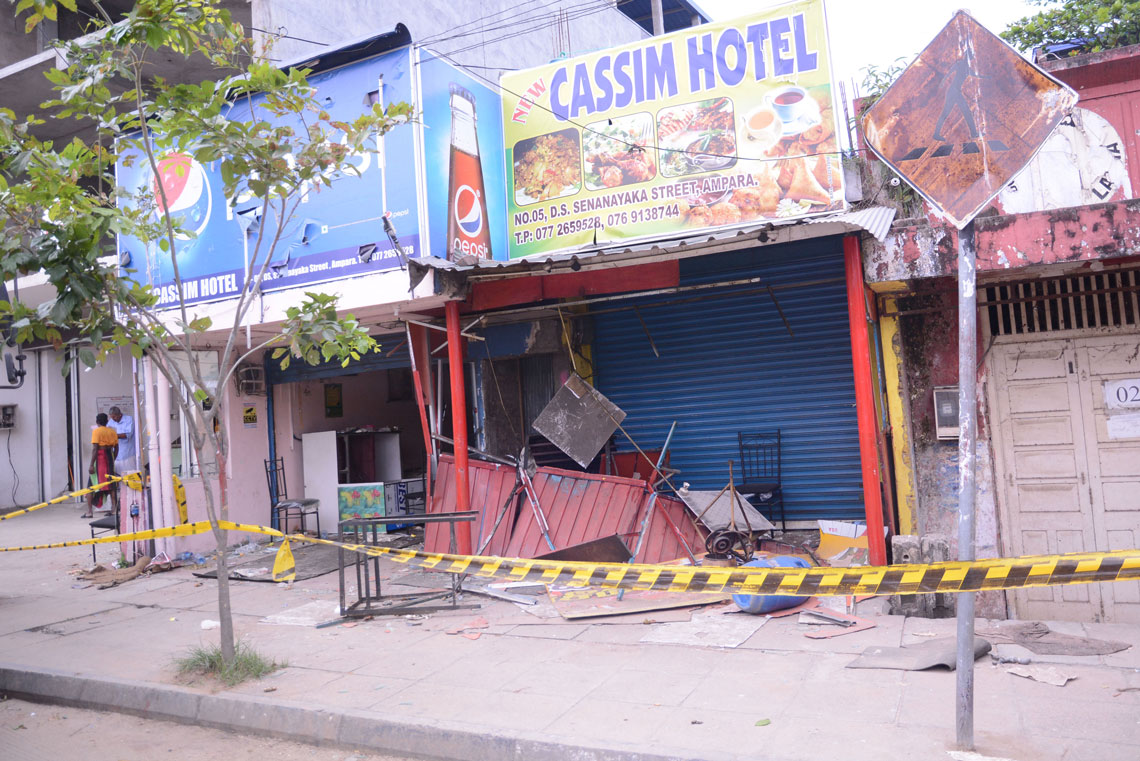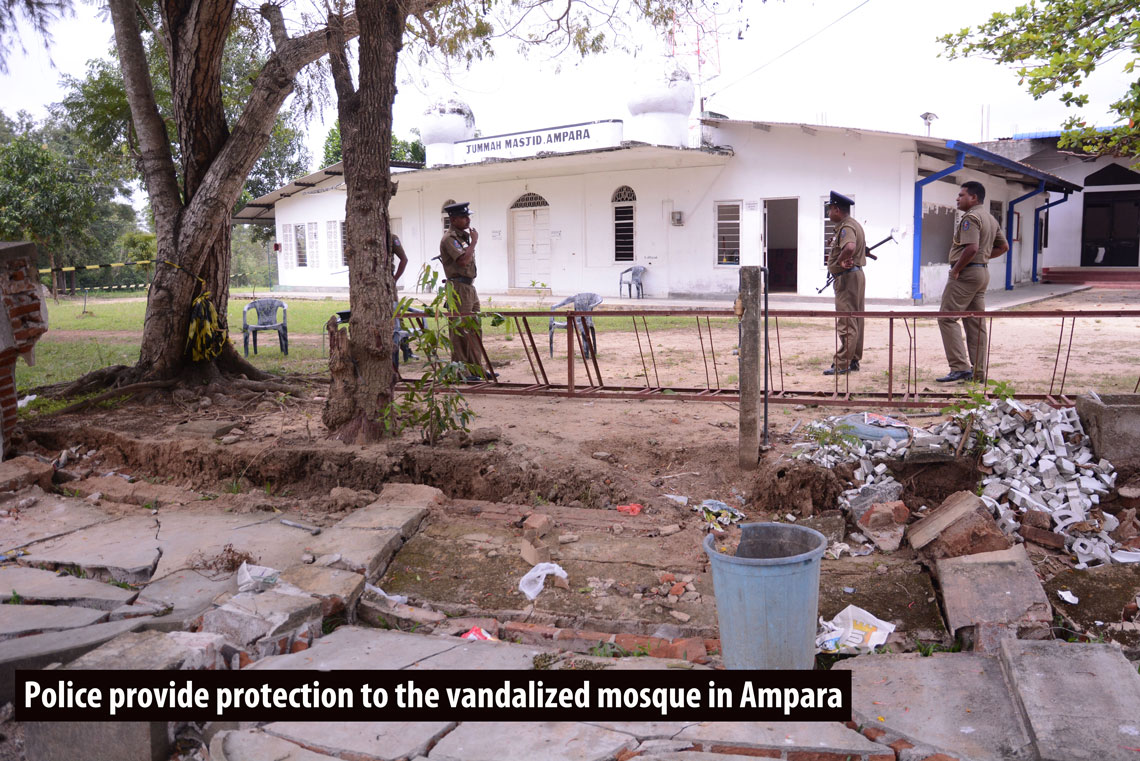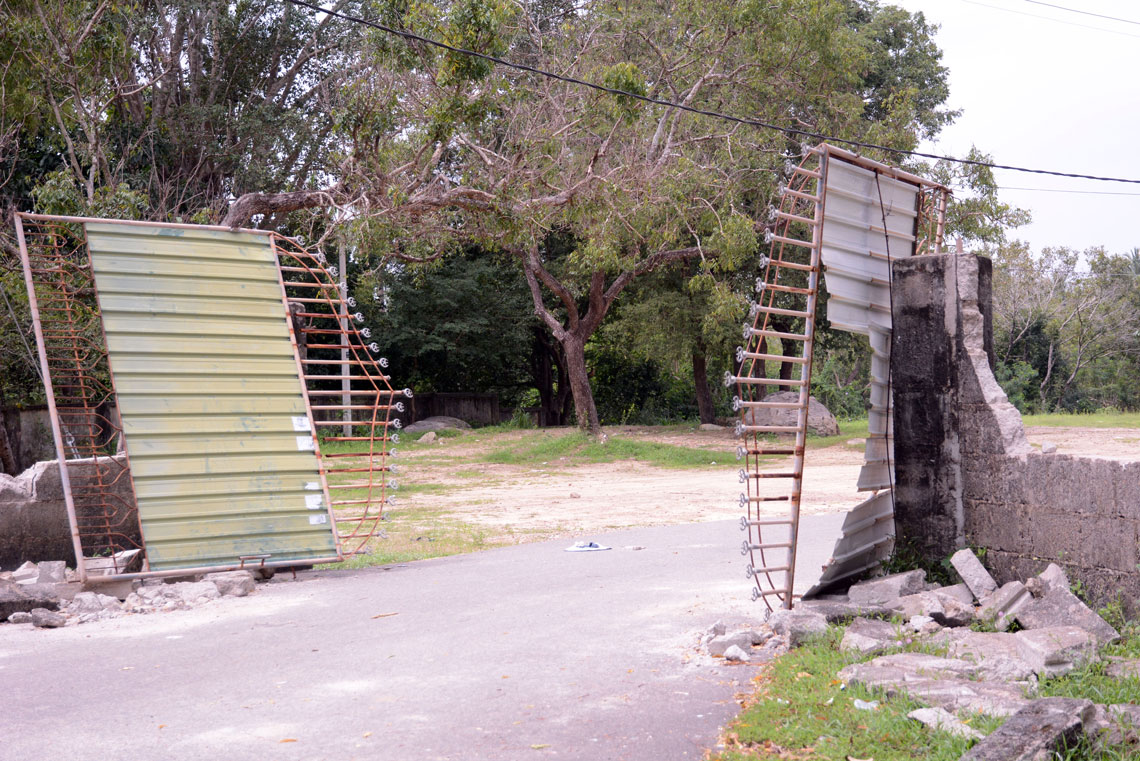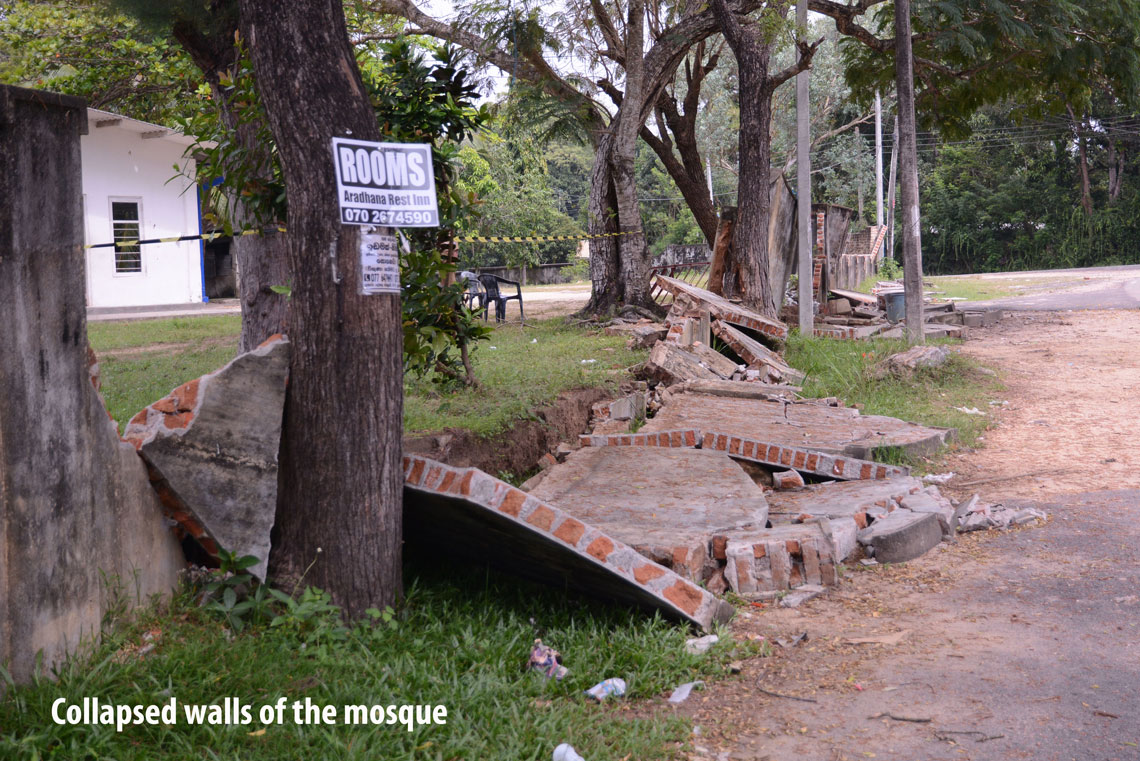23 Mar 2018 - {{hitsCtrl.values.hits}}
 New Cassim Hotel on D.S. Senanayake Street in Ampara town
New Cassim Hotel on D.S. Senanayake Street in Ampara town
“Do not go upon what has been acquired by repeated hearing; nor upon tradition; nor upon rumour; nor upon what is in a scripture; nor upon surmise; nor upon an axiom; nor upon specious reasoning; nor upon a bias towards a notion that has been pondered over; nor upon another’s seeming ability; nor upon the consideration.”
-Gautama Buddha (Kalama Sutta)The Buddha’s Charter of Free Inquiry
A group of doctors recently broached the topic and ruled out the existence of such infertility pills anywhere in the world
General public doesn’t think logically about certain topics such as the infertility pill scare due to lack of scientific literacy
Since the scare regarding the infertility pill stared spreading many myths associated with infertility have been floating around
Education is not being used for a larger purpose in this country other than passing exams and finding employment
UNFPA stresses the need to ensure increased access to accurate reproductive health information
Life in Kandy and Ampara Districts has returned to normalcy now. The country is at present experiencing calm after a storm. The unrest in Ampara sparked with the speculation that a pill that causes infertility had been mixed with food served in New Cassim Hotel, a small scale local restaurant in  Ampara town. The violence that followed, encouraged by deep-rooted racial bigotry, spread from Ampara to central Kandy, claiming two lives, leaving several injured and causing colossal damages to property.
Ampara town. The violence that followed, encouraged by deep-rooted racial bigotry, spread from Ampara to central Kandy, claiming two lives, leaving several injured and causing colossal damages to property.
However, a debate on such medicine causing infertility raged as to whether there is any medicine prescribed either in Western or Ayurvedic Medicine to make a human being sterile. A group of doctors recently broached the topic and ruled out the existence of such infertility pills anywhere in the world. Officially setting aside the speculation that such a pill had been mixed with food in the hotel in Ampara, the Government Analyst’s Department confirmed that samples of particles found in food sold at the eatery did not contain sterilizing chemicals as alleged, but were mere clumps of flour.
The people reacted to the speculation that was present. They were so judgmental without inquiring into what they heard, hence these incidents, which seriously questions the level of education that the general public possesses regarding reproduction and sexual matters.

Ranga is a father of two and works at the National Water Supply and Drainage Board, Ampara. First, he was not willing to give interviews to any media agency claiming it would create more troubles for him. Later he was positively influenced by his friends to give his reasons because the cashier of New Cassim Hotel had already spoken to the media. They said that Ranga too should speak out, so that people can hear both sides of the story.
On February 26, Ranga dropped in at New Cassim Hotel for a meal. He wanted beef koththu. By that time, beef koththu was not available. Then, he wanted parotta with beef curry. He had said that he wanted to eat soon as he had just injected insulin for his diabetic condition. Ranga, who finished the first dish of beef curry, ordered another. Minutes later, he claimed that he had found a floating particle in the curry.

Police provide protection to the vandalized mosque in Ampara
“The particle I found in the curry resembled a yellow coloured piece of rubber. I questioned them regarding that particle. I did not want to commence a racial attack on the Muslim brothers. I am very disappointed that this incident spread violence in many parts of the country.
“I am not a troublemaker. I have not engaged in any anti-social activity and not tarnished my good name in the village. After this pill incident, I have been receiving calls threatening me with death. I have two kids. My family is living in fear now,” he said.
The particle I found in the curry resembled a yellow coloured piece of rubber. I questioned them regarding that particle. I did not want to commence a racial attack on the Muslim brothers
-Ranga
“Strangers are visiting my house under the guise of beggars. I have many Muslim friends. They maintain a very good relationship with me. I was compelled to raise the question regarding the dish because there was a particle. First, I had my doubts regarding the particle I found in the beef curry. However, another incident, which was not reported in the media, raised my eyebrows. Two of the hotel workers, including the brother of the cashier of the hotel (Farsith) ran away carrying two bowls containing the rest of the beef curry, served to me. That is when I made calls to my friends out there. If there wasn’t anything to hide, why did they run away carrying the bowls which contained the beef curry?” he asked.
According to Ranga, he had no involvement in the attack on New Cassim Hotel.
Ranga said that he had followed the police jeep in his motorcycle to the police station with the intention of lodging a complaint. “I was not at the scene when the hotel was burnt down. Yet, I was arrested with the charges of attacking the hotel,” said Ranga.
The cashier of the New Cassim Hotel, Ahamed Farsith still looked shocked and confused when we reached his residence in Irakkam, Ampara. Being a 28-year-old bachelor who is not even fluent in Sinhala, Farsith told the Dailymirror that he is still afraid to go to the town alone.
“First, I thought Ranga was pissed off after finding a piece of plastic or rubber in the curry. It was later that I was told that he suspected the piece to be an infertility pill,” he said.
“Everyone told me that I appear in a video confessing to the crime of mixing infertility pills with the food. The video went viral on Facebook. I was blamed, shamed and heavily criticized over something that I had no involvement in. I have never heard of ‘wandapethi’ or sterilization pills until the day the mobs descended on my restaurant,” Farsith said.
Everyone told me that I appear in a video confessing to the crime of mixing infertility pills with the food.
The video went viral on Facebook
-Ahamed Farsith
According to Farsith, Ranga who is a regular customer at his hotel, had come alone on that day and ordered Koththu Parotta with beef.
Even after being told that Beef Koththu Parotta was not available at that time, Ranga had demanded beef curry claiming his blood sugar level had risen. He believed eating beef would increase the vitamin and mineral levels in his body and control the high sugar level in his body.
When Ranga had finished eating the first beef curry dish the second beef dish arrived on the table.
“All of a sudden, he came to me, showed some particle claimed to have been found in the curry and asked me what it was. I said it should be a clump of flour. Ranga didn’t appear to have accepted what I had said. When he repeated the same question in a different tone, I asked him to speak to the fellow worker in the hotel as my Sinhala is not good,” Farsith recalled.
Ranga, who did not pay heed to what he was told, made a few calls. Two other customers, who were having food in the hotel by the time this argument took place, also joined Ranga and started abusing Farsith. Within a short period of time, around twenty five men surrounded the hotel among whom was the person who video recorded Farsith acknowledging that he mixed infertility pills in the beef curry.

Gate to the vandalized mosque
“He began asking, “dammadha, dammadha, Wanda Pethi dammadha?” (Did you put infertility pills?). I was afraid of my life. There were dozens of men. I was compelled to say yes to whatever the men asked me,” reminisced Farsith.
Regulars to the hotel know that Farsith is not fluent in Sinhala. Farsith, however said that Ranga is not a trouble maker, adding that he often dines at the hotel accompanied by his wife and kids. Farsith believes that Ranga must have been under the influence of alcohol to act in that disturbing manner.
As people flocked to the hotel, the police were alerted. The doors of the hotel were closed following the arrival of two policemen. Farsith and the cook were taken to the Ampara Police Station to record a statement. According to him, a few policemen had remained in front of the hotel to control if the situation got out of control. He claimed that the attack on his hotel must have happened in the presence of policemen who witnessed the attack unfold.
Government Analyst A. Weliangage told the Dailymirror that the particles found in the beef curry in New Cassim Hotel, Ampara were clumps of flour; contents of carbohydrates (starch).
“It was a small dough and not anything related to a drug. An analysis of the particles revealed that they comprised carbohydrates. We have sent a detailed report to the Ampara Magistrate and the DIG as there is an ongoing case related to this incident. Necessary actions will be taken by the authorities based on the report,” he said.
It was a small dough and not anything related to a drug. An analysis of the particles revealed that they comprised carbohydrates
-A. Weliangage
He rebuked an allegation leveled by certain parties that even if the Government Analyst Department found the particles in the curry to be particles relating to a drug, the Government would have instructed not to divulge it to the public because it alone can lead to more communal clashes.
“We are an independent department and take responsibility in the information we are expected to release to the public,” he said.
Unless someone is a medical professional, it can be difficult to tell which information about infertility is true. Even the readers wouldn’t believe what is said. Since the scare regarding the infertility pill stared spreading many myths associated with infertility have been floating around. As a result the truth has become even murkier. Therefore, the Dailymirror spoke to a doctor practicing Western Medicine. Dr. Upali Dissanayake was one of the medical professionals who came forward to make the general public aware of the truth regarding infertility pills. In order to obtain the findings in Ayurvedic Medicine regarding infertility, we also contacted another doctor Sujeewa Vithanage, who has practiced Ayurvedic Medicine for the past 18 years.

Many of us know that fertility in males and females can be influenced by many factors. The continuous use of medicinal drugs containing heavy metals are only one factor which can potentially affect fertility.
Dr. Dissanayake stated that though the pharmaceutical industry has been searching for a medicinal drug which can cause temporary infertility, so that it can be used as a male contraceptive agent, similar to oral contraceptive tablets taken by women to prevent pregnancies, such a medicine has not been developed yet in any part of the world.
“The infertility pill is a mere myth. There is nothing to worry or be scared of regarding this myth,” he said.
The infertility pill is a mere myth. There is nothing to worry or be scared of regarding this myth
-Dr. Dissanayake
Male fertility depends on the presence of adequate numbers of active spermatozoa which are normal in structure and function in seminal fluid. When either the number of spermatozoa are reduced, or their function and mobility are impaired, the ability to impregnate a woman is reduced and this results in sub-fertility (difficulty in conceiving a child) and in extreme situations, infertility (the inability to conceive a child). Similar factors may affect the fertility of a woman, Dr. Dissanayake explained.
Dr. Sujeewa Vithanage said that irregularities in the hormone system, having an autoimmune disorder (diseases such as lupus, diabetes, thyroid disease, and rheumatoid arthritis which can interfere with fertility), continuous use of medication, using tobacco or alcohol, being exposed to occupational or environmental hazards (prolonged exposure to high mental stress, high temperatures, chemicals, radiation, or heavy electromagnetic or microwave emissions) and having certain conditions or illnesses due to accidents may reduce fertility.
“There are instances where a man’s or a woman’s fertility could be affected as a result of using adverse medication for a prolonged period of time. It is possible to make someone sterile, but only through continuous use of such strong medication,” he said.
It was hilarious how the people believed that the Muslims had access to such a miraculous pill, as alleged
-Dr. Vithanage
He emphasized that there is no pill introduced so far to make a human being sterile forever. He said it was hilarious how the people believed that the Muslims had access to such a miraculous pill, as alleged.
Meanwhile, the resident offices of the World Health Organization (WHO) and the United Nations Population Fund in Sri Lanka (UNFPA) have dismissed this inaccurate information.
Accordingly the two UN Resident Agencies, in a joint statement said they condemn such action in the strongest possible terms.
In a statement UN Resident Coordinator and WHO Representative in Sri Lanka, Dr. Razia Pendse said, “There is no medication or ‘pills’ at present known or available that can permanently make a human being sterile. The information on use of an ‘infertility pill’ or ‘sterilization pill’ mixed with food is baseless with no scientific evidence”.
Adding wrong information on reproductive health is being used to ignite hatred and create tensions between ethnic communities
-Ritsu Nacken
In the meantime, UNFPA Representative in Sri Lanka, Ritsu Nacken, said the need to ensure increased access to accurate reproductive health information, especially among youth, is apparent.
“Adding wrong information on reproductive health is being used to ignite hatred and create tensions between ethnic communities,”Nacken said.
There is definitely a lack of knowledge and public awareness about issues related to sex and reproduction, experts say. They claim that Sri Lanka does not have an organized programme to provide counselling and information to vulnerable groups. They believe that lack of human resources with necessary skills and experience on issues related to reproduction, cultural factors that have limited open discussion of issues, the lack of research on the topic and the needs of adolescents and youth have resulted the general public being exposed to scarce and false data and knowledge, not forgetting the weak political commitment for coherent policy initiatives.
According to a study conducted by Institute for Health Policy (IHP), informal interviews revealed the importance of sex education in schools and the school was identified as the most appropriate place to educate children on Sexual and Reproductive Health. However, the study found that officials in the education sector did not have a clear idea on age appropriate education on reproduction and the current needs of adolescents.
Speaking on the matter, Dr. Upul Dissanayake said as far as he is concerned, the only place sex education is available in Sri Lanka is in medical schools. The national school syllabus in science includes sex education. The content is restricted to biological aspects of reproduction.
In a misguided belief, possibly a majority of parents consider that non discussion of sex will keep their children safe from sex
-Dr. Dissanayake
“However it is found that the teachers are reluctant to educate the children even what is there in the syllabus,” Dr. Dissanayake said. Giving reasons, he said there is parental pressure not to discuss sex in school and there is the innate shyness on the teachers’ part to educate students on this topic.
“In a misguided belief, possibly a majority of parents consider that non discussion of sex will keep their children safe from sex. The parents see their children as babies even when they grow up and there is reluctance to accept that with growth comes sexual inquisitiveness. I tell the parents to ask themselves whether the age old practice of non-disclosure kept them from knowing facts of life,” he noted.
Dr. Dissanayake emphasized that parents should not forget that when there is no credible source to satisfy their curiosity, children seek alternative ways such as from peers and elders- who have no proper knowledge, the internet and by using pornography. The result is lopsided knowledge and wrong information.
He was of the view that there is hardly any focus on pedophilia, sexual abuse or unwanted pregnancies and how to prevent them. “We have to acknowledge that these are problems in the society and shoving them under the carpet would not keep child safe from such hazards. As a result of this inadequate knowledge the population, even after leaving school, is easy prey for misinformation and myths,” he warned.
Former Head of Sociology Department of Colombo University, Professor Siri Hettige said the fertility pill issue is a tip of an iceberg.
He was of the view that the general public doesn’t think logically or analyze facts when it comes to certain topics such as the infertility pill scare due to lack of scientific literacy.
Religion has replaced science in this country.
There is no scientific literacy being imparted in the people of Sri Lanka
-Prof. Siri Hettige
“This is a manifestation of a deeper problem in the society. This racial bigotry may come in any form. It once surfaced as issue with Halal. It will surface again in the future unless the issue is resolved,” he said.
Prof. Hettige said scientific literacy of the general public in Sri Lanka is at a sorry state. “The education system has been reduced to an instrumental activity. We have lost the substantive value of education. Education is not being used for a larger purpose in this country other than passing exams and finding employment. The most critical point regarding education is missing in Sri Lanka. Secular education should be established in Sri Lanka,” said Prof. Hettige.
“Religion has replaced science in this country. There is no scientific literacy being imparted in the people of Sri Lanka. Someone might have a PHD, but without basic and most important knowledge. This is because Sri Lankans have failed to keep the three places the home, the school and the temple apart,” said Hettige.
He expected the spread of modern science in many parts of the world to drive secularisation – that science would be a secularising force. But that simply hasn’t been the issue when it comes to Sri Lanka, he said.
“If we look at our society where religion remains vibrant, their key common features are less to do with science, and more to do with feelings. The story of science and secularisation becomes even more intriguing when we consider the Sri Lankan society that has witnessed significant incidents where people reacted to religion related matters,” he stated.
He queried whether many schools in Sri Lanka are free of religious influence? “Religion has a natural place in their homes and their children grow up with it. And that’s fine. But does this not make it all the more important for schools to be free of religious influence? Religions by nature always run the risk of creating an “us against them” scenario. However tolerant we are, there is always a reason people consider their own religions are superior to all others. This has to be changed. Otherwise, the country is heading towards anarchy,” he stated.
Pics by Pradeep Pathirana
18 Apr 2024 43 minute ago
18 Apr 2024 1 hours ago
18 Apr 2024 2 hours ago
18 Apr 2024 3 hours ago
18 Apr 2024 4 hours ago